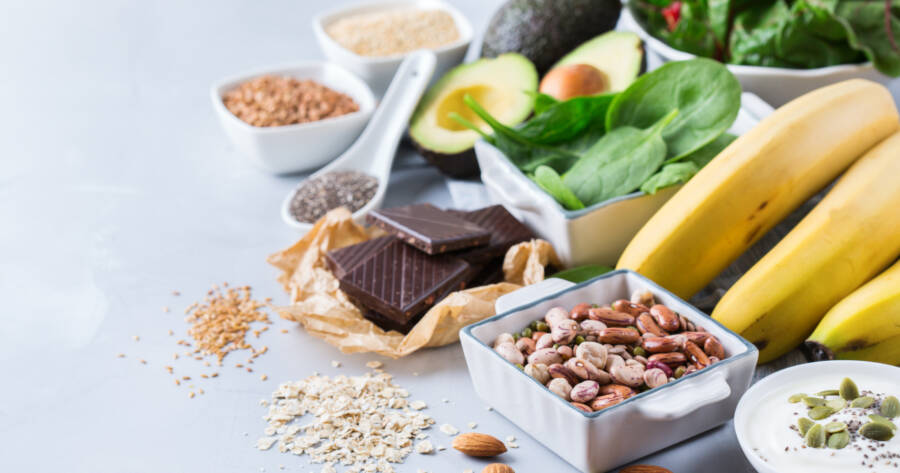Magnesium is a vital mineral that plays a crucial role in our overall health, but it’s often overlooked in discussions about nutrition. Fortunately, you can learn how to incorporate more magnesium into your diet with a quick search online.
Despite its importance, many people don’t get enough magnesium in their diets, leading to a range of health issues. Arm yourself with knowledge by exploring these five fantastic dietary sources of magnesium.
The Importance of Dietary Magnesium
Magnesium’s role in our diet cannot be overstated. It’s crucial for the proper functioning of numerous systems in our body. A diet rich in magnesium is associated with several health benefits, including improved bone health, reduced risk of heart disease, better blood sugar control, and even relief from migraine headaches.
Unfortunately, magnesium deficiency is relatively common due to factors like poor diet, certain medical conditions, and the use of specific medications. Signs of magnesium deficiency can be subtle at first but may manifest as muscle cramps, fatigue, mental disorders, osteoporosis, and an increased risk of chronic diseases if left unchecked.
Additional Health Benefits of Magnesium
Beyond preventing deficiency, magnesium offers numerous additional health benefits. It’s known for its role in energy production and protein synthesis. Magnesium also has a calming effect on the nervous system, making it beneficial for stress management and sleep quality. For athletes and those with active lifestyles, magnesium aids in muscle recovery and performance.
Magnesium also plays a significant role in maintaining healthy blood pressure levels and may help prevent migraines. Its anti-inflammatory properties are also beneficial in reducing the risk of chronic diseases and improving overall health.
Spinach: A Magnesium Powerhouse
Spinach, the leafy green vegetable often associated with strength, is a magnesium powerhouse. Just one cup of cooked spinach provides a significant portion of the recommended daily intake of magnesium. This versatile vegetable is not only rich in magnesium but also in iron, vitamin A, and antioxidants.
Regular consumption of spinach can contribute to improved eye health, reduced oxidative stress, and lower blood pressure levels. Including spinach in your diet is easy; it can be added to salads, smoothies, and a variety of cooked dishes.
Nuts and Seeds: A Crunchy Source of Magnesium
Nuts and seeds are small but mighty sources of magnesium. Almonds, cashews, and Brazil nuts are among the top contenders, offering a substantial amount of magnesium per serving. Seeds like pumpkin, chia, and flaxseeds are also excellent choices.
These nutrient-dense foods are not only rich in magnesium but also provide healthy fats, fiber, and protein. Integrating a handful of nuts or seeds into your daily diet can improve heart health and even aid in weight management.
Whole Grains: More than Just Fiber
Whole grains are often praised for their high fiber content, but they are also fantastic sources of magnesium. Whole wheat, oats, barley, and quinoa are just a few examples of whole grains that can boost your magnesium intake.
These grains are beneficial for digestion, help in managing blood sugar levels, and may reduce the risk of chronic diseases. Including a variety of whole grains in your diet ensures you not only get magnesium but also other essential nutrients like B vitamins.
Dark Chocolate: A Delicious Source of Magnesium
For those with a sweet tooth, dark chocolate is a delightful way to increase magnesium intake. Rich in magnesium, antioxidants, and flavonoids, dark chocolate offers health benefits like improved heart health and brain function.
However, it’s important to choose dark chocolate with a high cocoa content and consume it in moderation due to its calorie and sugar content.
Avocado: A Creamy Magnesium-Rich Fruit
Avocado, the creamy fruit famous for its role in guacamole, is another excellent source of magnesium. It’s also packed with heart-healthy monounsaturated fats, fiber, and various essential vitamins and minerals.
Regular consumption of avocado can lead to better heart health, improved digestion, and enhanced nutrient absorption from other foods.
Learn More Today!
Magnesium is a critical nutrient, and incorporating these high-magnesium foods into your diet is a delicious and effective way to ensure you’re meeting your needs. From leafy greens like spinach to the indulgence of dark chocolate, these foods not only provide the magnesium your body requires but also a host of other health benefits.
Remember, a well-balanced diet is key to maintaining good health, and understanding the role of different nutrients, like magnesium, is essential. Continue exploring the world of nutrition online to discover more about the importance of magnesium and how to include it in your diet for a healthier, happier you.
